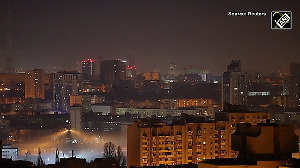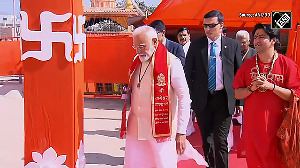In an attempt to counter India's contention that Pakistan is stalling the investigation and prosecution of those who planned, conspired and launched the Mumbai terror attacks from its territory, Islamabad's Ambassador to the US Hussain Haqqani has said that 'his country has been and is being cooperative'.
Haqqani, who had been leading a major public relations effort in Washington in trying to dissipate the anger and concern in Congressional circles and among the public at large on this score that Pakistan is not being wholly cooperative, acknowledged that "given the history of India-Pakistan relations, you will have some sort of backward and forward movement. There will be some people in Pakistan, who will be saying, 'Yes, India has not been 100 per cent transparent in discussing this matter,' and there will be people in India, who will be saying, 'Pakistan has not been transparent.'"
But, he asserted that "the most important thing is that on the current account, and talking about the future, there will be no tolerance, of terrorism against India launched from Pakistan."
Speaking at the Ambassadors Roundtable Series hosted by the Homeland Security Policy Institute of George Washington University, and addressing an audience that included State, Pentagon, Homeland Security, intelligence and senior Congressional aides, Haqqani said, "We can't change the past -- whatever has happened in the past has happened in the past in the entire region. We are not going to get into that. It is not going to be useful for anyone."
However, he reiterated, "On the current account, and in the future, Pakistan is going to be clearly aligned with the international community and its neighbours -- both its neighbours, Afghanistan and India -- in making sure that the whole region is not a safe haven for terrorists."
Haqqani declared, "There is clarity of direction. Any ambiguity that Pakistan needs to fight terrorists for somebody else's sake is now gone. It may exist in Pakistani society, (but) it does not exist in any branch of the Pakistan government."
"Pakistan's intelligence services are actively changing in terms of prioritizing their operations," he said, adding, "The elimination of terrorist groups themselves has become a priority. Cooperation with the US, is improving."
Haqqani acknowledged that this "doesn't mean there have not been suspicions and fears -- the fears of both sides. There are people in US intelligence who think 'Are these trustworthy' and on the other hand, there is a Pakistani suspicion, 'Will the US leave us in the lurch again, so therefore do we want to go with them, the whole hog'. But, the whole point is, when you understand that this is not for Americans, but for ourselves then you are more likely to be firm and clear in what you do."
The envoy said, "Even in the question of groups of jihadis whose primary target was India, there is absolute clarity in Pakistan that these guys are not to be tolerated or encouraged."
And, he reiterated that "in the aftermath of Mumbai, we have been very clear, in saying, that as long as we know who did it, we will work together with the Indians."
Haqqani pledged that "when we identify people who have had anything to do with it, they will not only be subjected to the treatment that they deserve, but it will be done in a cooperative manner."
Taking exception to arguments among several analysts and intelligence officials that the new Pakistan government has no control over the Inter Services Intelligence or the Army, the envoy asserted that "Pakistan's President, Pakistan's Prime Minister, Pakistan's new military chief and Pakistan's new intelligence chief, are all on the same page in understanding and recognizing that terrorism poses a threat to Pakistan's own stability --that terrorism is not a legitimate means of securing any security advantages in the region."
"And, so, what we are going through right now is a transformation, and this is not just a transformation in the area of security, it is actually a transformation that is multi-dimensional. Pakistan is transforming from an authoritarian to a democratic culture," he said.
Haqqani said that the "Pakistani State is now ready to acknowledge and understand that terrorism and extremism are problems for Pakistan, that Pakistan must deal with."
He said this realization was extremely important because during the preceding rule of the military leader President Pervez Musharraf, "he presented the war against terror from the first day after 9/11, when he addressed the nation, as something that Pakistan was doing because it had been told by the world's sole superpower that either you are with us or against us."
Haqqani bemoaned that "this major change is something that has not yet fully been understood that Pakistan's question of will are no longer an issue -- the question now is a question of capacity."
And evidently making a strong pitch for the continuance of the massive US military and economic aid, the ambassador made a case for the alleviation of this lack of capacity for his nation, "with a 170 million people, one-third of them living below the poverty line, with a military that has been essentially maintained because of a perceived threat from Pakistan's much larger eastern neighbour, a society that has suffered from neglect from successive government, because the whole perception was that Pakistan is an embattled and threatened nation and so, therefore, it needs to build up its security at the expense of society."






 © 2025
© 2025